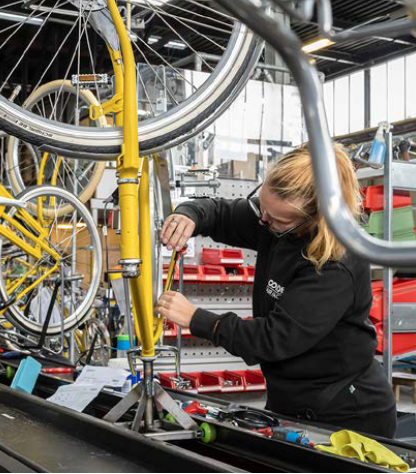Netherlands introduces National Circular Economy Program 2023 – 2030
February 16, 2023
State Secretary Heijnen of the Netherlands Ministry of Infrastructure and Water Management has released the National Program Circular Economy (NPCE) 2023 -2030, a comprehensive plan aimed at transitioning the Netherlands to a circular economy. Until now, the Dutch circular economy policy has largely focused on voluntary measures; this time, the government are guiding and compelling measures to achieve these goals.
The program outlines various actions, including developing innovative business models, waste reduction strategies, and collaboration with businesses and knowledge institutions to create a sustainable economy. The NPCE is part of the government’s broader efforts to address climate change and will be implemented over the next seven years.
Download the National Circular Economy Programme 2023-2030 Summary

Netherlands ambitions and goals for 2050 and 2030
The Netherlands wants to be fully circular by 2050. This means that the environmental effects of the use of raw materials for Dutch production and consumption will stays within the ‘planetary limits’. To achieve this, the government is introducing guiding and compelling measures, including a mix of pricing, standardizing and stimulating policies. The National Program for the Circular Economy 2023-2030 has been developed to supplement the existing measures by focusing on the input side and the user phase of the production process.
To make the transition more effective, the government has formulated specific measures for the five product chains that have the most significant environmental impact:
- Consumer goods: electrical and electronic appliances; packaging and disposable products; textile; furniture.
- Plastics: plastic packaging; construction plastics; agricultural plastic.
- Construction: housing; offices and industrial halls; concrete viaducts and bridges; road pavement.
- Manufacturing industry: Capital Equipment ; wind farms; solar PV systems; climate installations.
- The activities within the biomass & food chain fall within the transition to circular agriculture.
The government will collaborate with other countries to make international agreements on environmental standards, sustainable employment conditions, and working conditions in production processes to ensure a fair transition.
General measures
There are four ‘buttons’ that can be turned with circular economy policy to make our use of raw materials more circular. The measures in the NPCE are aimed at this:
- Reducing the use of raw materials: using fewer (primary) raw materials by refraining from producing or buying products, sharing them or making them more efficient (‘narrow the loop’) .
In the NPCE, for example, the ambition has been formulated that the Dutch governments will make much more circular procurement. From desks and chairs to roads and waterworks. - Substitution of raw materials: replacing primary raw materials with secondary raw materials and sustainable bio-based raw materials that are applied to the highest possible quality, or with other, more widely available raw materials with a lower environmental impact.
For example, the obligation to a certain percentage of recyclate (recycled materials). - Lifespan extension: use products and parts longer and more intensively through reuse and repair. This slows down the demand for new raw materials (‘slow the loop’) .
A measure aimed at extending the lifespan is, for example, a repairer’s register from 2023 for electrical and electronic equipment, so that it is easy to find a suitable repairer; - High-quality processing : closing the cycle by recycling materials and raw materials, so that less waste is incinerated or landfilled and a higher-quality supply of secondary raw materials is created (‘close the loop’) .
In 2050, the burning of recyclable material must be a thing of the past. This requires interventions at the front of the chain. That is why we are going to help municipalities and residents of the Netherlands to separate waste even better.
